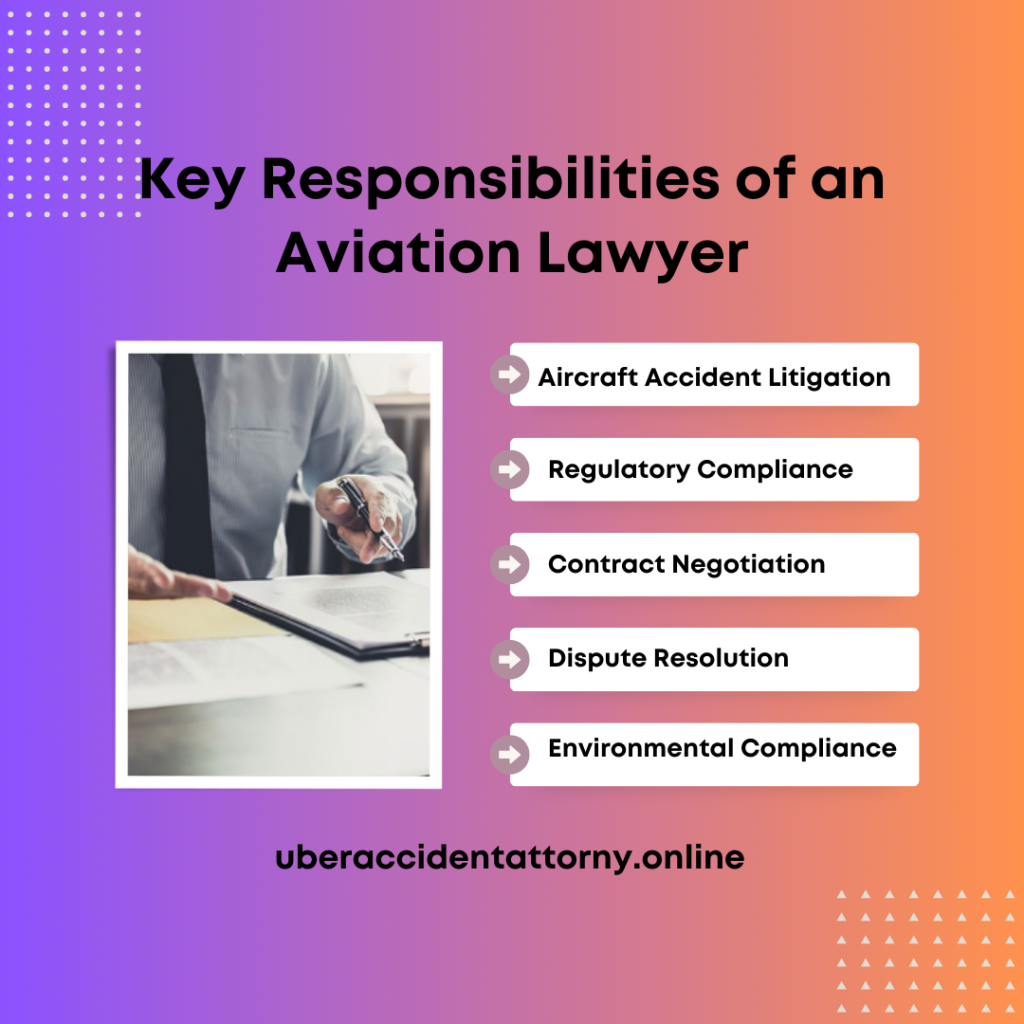“Explore the critical role of an Aviation Lawyer in handling legal matters related to air travel. From aircraft accidents to regulatory compliance, learn how these experts safeguard your rights in the aviation industry.”
The aviation industry is one of the most complex and highly regulated sectors in the world. Whether it’s a commercial airline, a private jet, or a cargo aircraft, the legal challenges that arise within this field require specialized knowledge and expertise. From aircraft accidents to intricate regulatory compliance issues, the need for an experienced Aviation Lawyer cannot be overstated.
These legal professionals possess a deep understanding of both the technical and legal aspects of aviation, making them indispensable in navigating the intricacies of aviation law. In this blog post, we will delve into the multifaceted role of an Aviation Lawyer, the various cases they handle, and why their expertise is vital in safeguarding the interests of all stakeholders in the aviation industry.
Understanding the Role of an Aviation Lawyer
An Aviation Lawyer is not just any lawyer—they are specialists who focus exclusively on aviation law, a field that covers a broad spectrum of issues related to air travel and aircraft operations. Their role is crucial in ensuring that all activities within the aviation sector comply with the relevant laws and regulations. The expertise of an Aviation Lawyer is called upon in various situations, from litigating high-stakes aircraft accidents to advising on complex international treaties.
Key Responsibilities of an Aviation Lawyer

- Aircraft Accident Litigation:
- Investigating the Cause: Aviation Lawyers collaborate with aviation experts to conduct detailed investigations into the causes of aircraft accidents. They analyze flight data, interview witnesses, and review maintenance records to determine what went wrong.
- Identifying Liable Parties: Determining liability in aviation accidents can be complex, involving airlines, manufacturers, maintenance crews, and even regulatory bodies. An Aviation Lawyer identifies all liable parties and pursues compensation for victims or defends against claims.
- Securing Compensation: Aviation Lawyers work tirelessly to secure fair compensation for victims and their families, covering medical expenses, lost wages, emotional distress, and, in the case of fatalities, wrongful death claims.
- Regulatory Compliance:
- Navigating FAA Regulations: The Federal Aviation Administration (FAA) enforces strict regulations on everything from aircraft operations to pilot licensing. Aviation Lawyers help clients navigate these regulations to ensure full compliance, avoiding costly penalties and legal issues.
- International Regulations: With the global nature of air travel, compliance with international regulations is critical. Aviation Lawyers are well-versed in international treaties, such as the Warsaw and Montreal Conventions, ensuring that their clients meet all international legal standards.
- Advising on Safety Protocols: Beyond compliance, Aviation Lawyers advise clients on best practices and safety protocols to mitigate risks and ensure the highest standards of safety in their operations.
- Contract Negotiation and Drafting:
- Aircraft Transactions: Whether buying, selling, or leasing aircraft, these transactions involve significant financial investments and legal complexities. Aviation Lawyers draft and negotiate contracts to protect their clients’ interests and ensure that all agreements are legally sound.
- Maintenance and Service Agreements: Aviation Lawyers also handle contracts related to aircraft maintenance and services, ensuring that all terms are clear and enforceable, reducing the risk of disputes down the line.
- Pilot and Crew Contracts: Legal representation is also crucial in drafting employment contracts for pilots and crew members, addressing issues such as liability, working conditions, and regulatory compliance.
- Dispute Resolution:
- Litigation and Arbitration: Disputes in the aviation industry can arise from a variety of sources, including breaches of contract, liability claims, and regulatory violations. Aviation Lawyers represent clients in court, as well as in arbitration and mediation, to resolve these disputes efficiently.
- Handling Insurance Claims: Insurance plays a critical role in the aviation industry, but disputes over coverage and claims are common. Aviation Lawyers negotiate with insurers to ensure that clients receive the compensation they are entitled to under their policies.
- Passenger Rights Advocacy:
- Addressing Violations: Passengers have rights that must be upheld, and Aviation Lawyers advocate on behalf of passengers who have experienced mistreatment, such as overbooking, flight delays, or injuries during a flight.
- Pursuing Compensation: In cases where passenger rights are violated, Aviation Lawyers pursue legal action to secure compensation, ensuring that passengers are treated fairly by airlines.
- Aviation Business Consulting:
- Advising Startups and Established Firms: Aviation Lawyers also play a consulting role, advising aviation startups and established companies on legal matters related to business operations, regulatory compliance, and risk management.
- Mergers and Acquisitions: In an industry where mergers and acquisitions are common, Aviation Lawyers provide crucial legal insights to ensure that these transactions are executed smoothly, with all legal obligations met.
- Environmental Compliance:
- Navigating Environmental Laws: The aviation industry is under increasing scrutiny for its environmental impact. Aviation Lawyers advise clients on compliance with environmental regulations, helping them mitigate risks related to emissions, noise pollution, and other environmental concerns.
- Sustainability Initiatives: Beyond compliance, Aviation Lawyers assist clients in implementing sustainability initiatives, ensuring that their operations align with evolving environmental standards and public expectations.
FAQ:
1. What is an Aviation Lawyer?
An Aviation Lawyer is a legal professional who specializes in the laws and regulations governing the aviation industry. They handle cases related to aircraft accidents, regulatory compliance, contract negotiations, and disputes involving airlines, manufacturers, pilots, and passengers.
2. When should I contact an Aviation Lawyer?
You should contact an Aviation Lawyer if you are involved in any legal issue related to aviation, such as an aircraft accident, disputes with an airline, FAA compliance concerns, or legal matters involving aircraft ownership, leasing, or financing. Their specialized knowledge can help you navigate the complexities of aviation law.
3. How does an Aviation Lawyer assist in aircraft accident cases?
In aircraft accident cases, an Aviation Lawyer conducts thorough investigations, works with aviation experts, and reviews flight data and maintenance records to determine the cause of the accident. They represent victims or defend airlines and manufacturers, aiming to secure compensation or mitigate liability.
4. What qualifications should I look for in an Aviation Lawyer?
When choosing an Aviation Lawyer, look for someone with specialized knowledge of aviation law, experience in handling aviation-related cases, a strong understanding of both domestic and international regulations, and a track record of success. It’s also important to find an attorney who is communicative and dedicated to your case.
5. Can an Aviation Lawyer help with FAA compliance?
Yes, an Aviation Lawyer can assist with FAA compliance issues by advising on regulatory requirements, helping you respond to FAA investigations or enforcement actions, and ensuring that your aviation operations meet all necessary safety and legal standards.
6. What role does an Aviation Lawyer play in aviation business transactions?
An Aviation Lawyer plays a crucial role in aviation business transactions by drafting, reviewing, and negotiating contracts related to aircraft purchase, leasing, financing, and management. They ensure that these agreements are legally sound, clear, and compliant with relevant regulations, protecting your business interests.
7. Are Aviation Lawyers involved in international aviation law?
Yes, Aviation Lawyers often deal with international aviation law, especially in cases involving cross-border flights, international airlines, or accidents that occur in international airspace. They are knowledgeable about treaties like the Warsaw and Montreal Conventions, which govern international aviation cases.
8. How do Aviation Lawyers handle passenger rights cases?
Aviation Lawyers handle passenger rights cases by advocating for passengers who have experienced mistreatment, such as denied boarding, flight delays, lost luggage, or injuries during a flight. They can help passengers understand their rights and pursue legal action or compensation when those rights are violated.
9. What is the importance of an Aviation Lawyer in environmental compliance?
With increasing regulations on the environmental impact of aviation, an Aviation Lawyer plays a key role in advising clients on compliance with environmental laws. They help companies mitigate risks related to emissions and noise pollution and assist in implementing sustainability initiatives that align with current regulations.
10. How do Aviation Lawyers support businesses in the aviation industry?
Aviation Lawyers support businesses by providing legal guidance on regulatory compliance, negotiating contracts, managing mergers and acquisitions, and advising on risk management. They ensure that business operations adhere to legal standards, protecting companies from potential legal challenges.
Conclusion:
In the dynamic and challenging world of aviation, the role of an Aviation Lawyer is indispensable. Their specialized knowledge and expertise allow them to navigate the complex legal landscape of the aviation industry, ensuring that clients—from airlines to passengers—are well-protected and legally compliant. Whether you’re dealing with an aircraft accident, regulatory issues, or business transactions, having a skilled Aviation Lawyer on your side is crucial. By understanding the vital role that these legal professionals play, you can approach the skies with confidence, knowing that you have expert legal guidance every step of the way.





